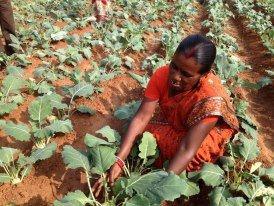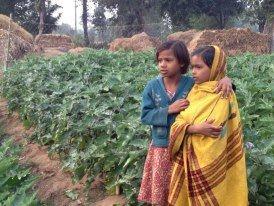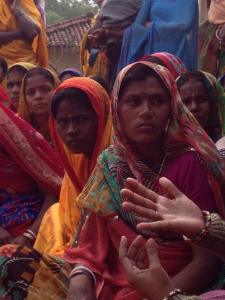 Rev. Brandon Gilvin is the Associate Director of Week of Compassion, and he is also a dang good writer. A native Kentuckian, he now lives in Kansas City with his wife, Lisa.
Rev. Brandon Gilvin is the Associate Director of Week of Compassion, and he is also a dang good writer. A native Kentuckian, he now lives in Kansas City with his wife, Lisa.
I recently returned from a two week trip to India, where I visited two very different states, Bihar and Meghalaya, to learn about some of the work supported through a partnership between Week of Compassion, Foods Resource Bank , and several other ecumenical partners from the FRB network. From the sleepy mountain town of Shillong to the chaotic bluster of Kolkata, India’s diverse people, landscapes, and cultures absorbed my attention, begged many questions, and gave me much to ponder.
 In the Northeast state of Meghalaya, where it was mountainous and lush, we met farmers from several indigenous groups, all of whom were learning new agricultural techniques to help provide consistent food to their households, grow food in more sustainable and efficient ways, and grow vegetables—not only to provide nutrients for their families but to provide farmers with new products to take to market. From small landholding farmers to landless people working on leased lands, all of the farmers shared stories of success: enough rice to last a year instead of only a few months, tomatoes that sold well at the local market, and a new sense of dignity. Farmers told us of their joy, their newfound hope, and how they even shared their new techniques with their neighbors.
In the Northeast state of Meghalaya, where it was mountainous and lush, we met farmers from several indigenous groups, all of whom were learning new agricultural techniques to help provide consistent food to their households, grow food in more sustainable and efficient ways, and grow vegetables—not only to provide nutrients for their families but to provide farmers with new products to take to market. From small landholding farmers to landless people working on leased lands, all of the farmers shared stories of success: enough rice to last a year instead of only a few months, tomatoes that sold well at the local market, and a new sense of dignity. Farmers told us of their joy, their newfound hope, and how they even shared their new techniques with their neighbors.
The projects in the drier, less fertile state of Bihar were similar in scope, including agricultural development and the launching of “Self-Help Groups” for women—encouraging women to save money for their families, teaching basic literacy, and providing them with a mechanism for small loans for household needs. The women involved in these projects come from either indigenous cultural groups or are designated as “Dalits” in the Indian Caste system. “Dalit,” a term that connotes their lack of caste status, roughly translates as “Oppressed,” or “Crushed.” If you’re like me, you learned another term for this group in middle school social studies: “ The Untouchables.” The cultural groups that make up the Dalit designation have long faced discrimination and have historically only found livelihood in menial labor. Though the Indian constitution protects the rights of all people in India and land reform provided some Dalit Indians, such as the families we met in Bihar, with land, they still face prejudice deeply woven into their culture and often struggle mightily to make ends meet. To meet Dalit women who spoke of being able to feed their families year round, and to hear them say how learning to sign their own names has given them a dignity they never before had was powerful, and inspiring.
 In both of the areas we visited, I felt proud of this unique partnership and the opportunities it gives us, as North American Disciples. By supporting this work, we get to make a difference, to help contribute to not only food security but human dignity—to help people once called “Untouchable” live into the name Gandhi used for them: “Harijan,” or “Children of God.”
In both of the areas we visited, I felt proud of this unique partnership and the opportunities it gives us, as North American Disciples. By supporting this work, we get to make a difference, to help contribute to not only food security but human dignity—to help people once called “Untouchable” live into the name Gandhi used for them: “Harijan,” or “Children of God.”
The Gospel text for this upcoming Sunday, the fourth in Advent, comes from a hymn of praise sung by Mary while she is pregnant with Jesus. One might imagine a mother’s song for her soon to be born child would be sweet or sentimental. Mary’s song is not. In fact, though I know this scripture pretty well, it still floors me every time I read it. Mary sings praise to God for the gift of motherhood, but when she describes God, she uses the poetics of justice, not sentimentality. This year, just days after my return from India, one verse in particular caught my eye:
“He has filled the hungry with good things, and sent the rich away empty.”
Haunting, striking words. Bold words that teach us something about the hope we proclaim in this season of expectation.
The hope of Advent has never been the hope of the well-to-do. It has always been the hope of the hungry, the oppressed, the illiterate. It is the hope of the mother whose main aspiration is to have enough rice to last a year. It’s an unsettling hope for those of us who have always been relatively food secure, safe, healthy, and raised with enough privilege to take our own hope for granted.
Advent hope is the hope of the Harijan.
May it be a hope that we prayerfully live into as well.
















